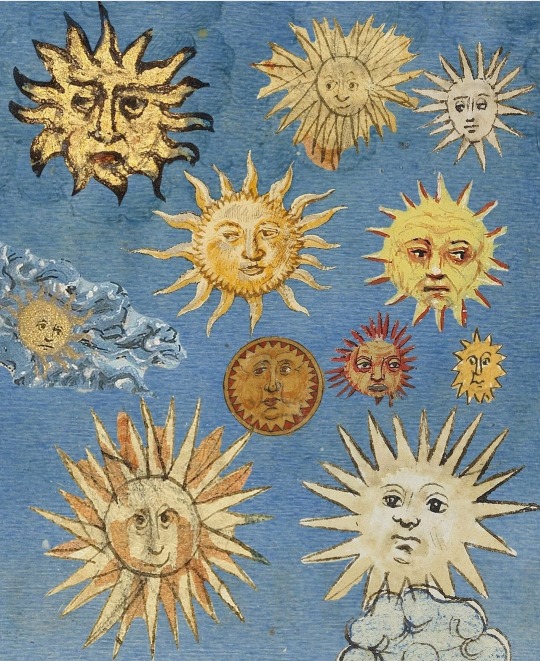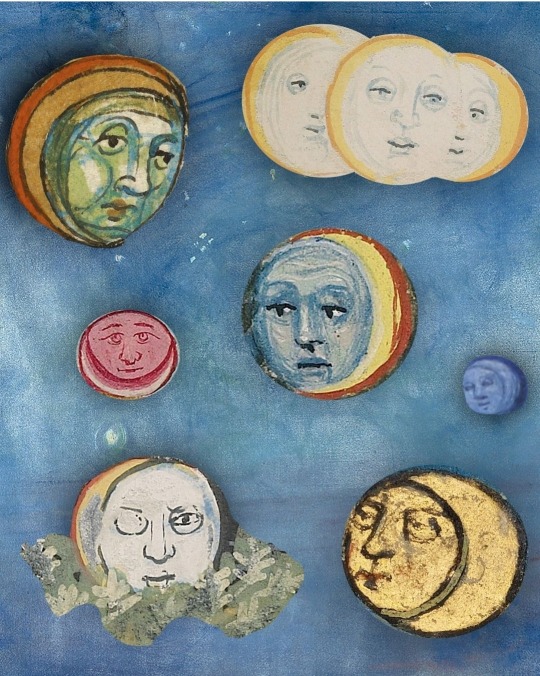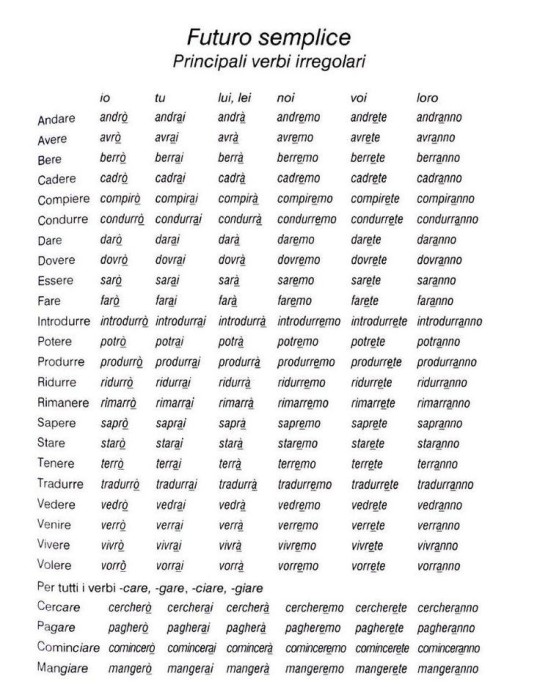Text





Tales of Runeterra: Ionia Concept Art - Ihor Pasternak
258 notes
·
View notes
Text





Hwei Short Story: "Paintings Framed in Half-Light"
921 notes
·
View notes
Text
Resource List for Learning Romanian
Hi Language Enthusiasts,
Do you want to learn Romanian but don’t know where to start? Then I’ve got the perfect resource list for you and you can find its links below. Let me know if you have any suggestions to improve it. I hope everyone can enjoy it and if anyone notices any mistakes or has any questions you are free to PM me.
Here is what the resource list contains;
Handmade resources on certain grammar concepts for easy understanding.
Resources on learning pronunciation.
Websites to practice reading.
Documents to enhance your vocabulary.
Notes on Colloquial Language.
Music playlists
List of podcasts/audiobooks And a compiled + organized list of websites you can use to get hold of grammar!
https://docs.google.com/document/d/1V849Z25xYNjhQTM2qGfHMXuJl07A6Lc19s7y2kqNFs4/edit?usp=sharing
133 notes
·
View notes
Text
A vs IN [prepositions part 2]
PART ONE
Generally speaking, with names of cities, you need to use “A”:
Vado a Roma (=I go to Rome; moving towards/to a place);
Sono a Roma (=I am in Rome; presence in a palce).
When you want to talk about movement as in coming from a city, use the preposition “DA”: Vengo da Roma (=I come from Rome).
With the noun “città”, use the preposition “IN”.
Sono in città (=I am in the city); Vado in città (=I go to the city). To express movement like coming from the city, use the preposizione articolata “DALLA”: Vengo dalla (da + la) città (=I come from the city).
In case you want to add the aggettivo possessivo, you need to add the article as well (generally in Italian the aggettivo possessivo needs the articolo determinativo, except for family members as “mio padre/mia madre/mio zio…”). So basically, you need to use the preposizione articolata again (articolo + preposizione): Sono nella (in=ne + la) mia città (=I am in my city); Vado nella (in=ne + la) mia città (=I go to my city); Vengo dalla (da + la) mia città (=I come from my city).
If you need to talk about coming back (=tornare) to your or a general city, the rules are the same:
Torno nella (in=ne + la) mia città (=I come back to my city).
Torno in città. (=I come back to the city)
-> To be honest, even if you don’t add the aggettivo possessivo, unless you’re in a different place, it’s kinda obvious that you’re moving to a specific city: let’s suppose you’re in the countryside around a city or even close to the city center but not in the city center of this city yet, and you say “Vado in città”: it means you’re going to that city center.
Summing up: when talking about being in a place (stato in luogo complement) and/or moving towards/to a place (moto a luogo complement), use “a + name of a city” OR “in + città”. When talking about coming from a place (moto da luogo complement), use da.
–
To express the MOTO A LUOGO (moving to a place) complement, there are actually 3 ways:
1) IN/NEL/NELLA: vado IN città, vado IN campagna, vado IN montagna (beware of the exception: vado AL mare), vado IN farmacia (vado NELLA farmacia all’angolo: preposizione articolata is used for more specific places)
2) A/AL/ALLA: vado A Roma, vado A casa, vado A casa di Marco, vado A casa della nonna, vado AL bar, vado AL ristorante, vado AL supermercato
3) DA/DAL/DALLA (generally used when a place involves people more directly/you associate place and people there): vado DAL barbiere, vado DALLA nonna, vado DA Luca, vado DAL macellaio
All these situations and exceptions (can be found more approfonditely in part 1 or ofc send an ask) must be learned by heart (or at least, you need to listen and practice a lot of Italian).
36 notes
·
View notes
Text
Le consonanti doppie
Double consonants in Italian can be tricky cause at times having 1 single consonant or 2 in the same word, can change its meaning. For example:
capello = hair (1 single hair); cappello = hat
pala = shovel; palla = ball
nono = 9th; nonno = grandpa
pena = pain (be in pain); penna = pen
Papa = Pope; pappa = porridge, food (esp. for kids)
rosa = pink, rose; rossa = red
sete = thirst; sette = 7
note = notes (music, annotations); notte = night
pane = bread; panne = breakdown (macchina in panne = car breakdown)
pani = breads; panni = rugs, laundry
sera = evening; serra = greenhouse
Now, how to deal with double consonants? There are a few rules. (Remember that especially if you are a beginner, your Italian vocabulary won't be as wide for obvious reasons, so when I mention about some words forming others don't mind too much, you can just learn the double consonants' ones as they are. Practice will be the first thing that will help you use and get used to these words and their meanings anyway):
if a word is made as: "prefix + word starting by consonant", you need to put a double consonant among the two (double the consonant with which the word is starting):
-with conjunctions: e, se, ne. E.g.:
e + pure = eppure
ne + meno = nemmeno
se + bene = sebbene
-with prepositions: a, da, fra, su. E.g.:
a + prendere = apprendere
da + prima = dapprima
fra + porre = frapporre
su + porto = supporto
-with adverbs: là, più, così, sì. E.g:
là + su = lassù
più + tosto = piuttosto
così + detto = cosiddetto
sì + che = sicché
- with prefix as: ra, sovra/sopra, contra. E.g:
ra + cogliere = raccogliere
sopra + tutto = soprattutto (ITALIANS I SEE YOU)
sovra + carico = sovraccarico
contra + bando = contrabbando
when you have words ending with the suffix -iere, you always need to add a double "z":
e.g. corazziere, carrozziere (autobody repairman), tappezziere (upholsterer). Be mindful that we have also:
-> corazza (armor)
-> carrozzeria (car body)
-> tappezzeria (tapestry)
It probably gets easier to know also when you should not put a double consonant:
First and foremost, words starting by 2/3 different close consonants (esp. the groups sc/sch/sg/sgh/st/sq...), never double:
e.g. scuola (school), stare (to stay), squalo (shark)
- if you have 2 (or 3) different consonants close in the middle a word (esp. the groups sc/sch/sg/sgh/st/sq/cq/rz...), none or them will double:
e.g. acquazzone (downpour), scherzo (joke)
-in particular s+consonant will never double, not even if it's in the middle of a word (esp. if you have the word "stare")
e.g. sovrastare (tower over)
when you have words ending as a/e/i+bile:
e.g. amabile (lovable), indelebile (indelible), incedibile (not transferable)
When you have words ending in: g/z + ione
e,g, colazione (breakfast), ragione (reason)
When you have words with zia, zio, zie:
e.g. reazione (reaction), pazienza (patience), anziano (old person) [exceptions: razzia (raid), pazzia (crazyness)]
When you have words buildt as: "prefix + words that start with a consonant", especially with the prefixes "contro, sotto, tra".
E.g.:
contro + corrente = controcorrente
sotto + stare = sottostare
tra + scorrere = trascorrere
There are ofc many other situations, but as I mentioned above, the main thing is to try and remember new words, espcially those you yourself find tricky, and try to work on their memorization. Practice, ask for help, and do not give up. For as tricky as it may seems, remember we do make mistakes too sometimes. I'm here if you have doubts or questions or want to point out something!
65 notes
·
View notes
Text
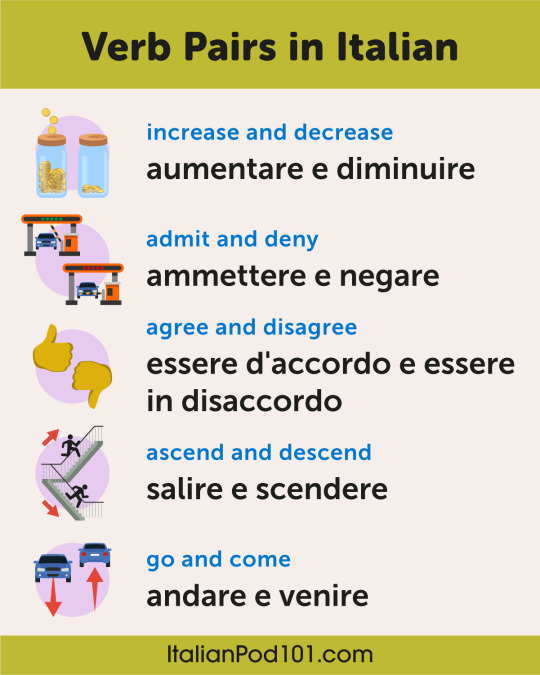
Verb Pairs in Italian 🎭 PS: Learn Italian with the best FREE online resources, just click here https://www.italianpod101.com/?src=tumblr_verb-pairs_image_051722
31 notes
·
View notes
Text
Language practice / pen pal game
I came up with a very simple idea to help me practice my target languages, so if you want to take part please hit me up !
What is the game ?
The goal is to find someone that is learning your native language and that speaks your target language.
Here are 30 questions. You should ask each other to answer a question (ex : number 18.) This gives you the opportunity to write a paragraph that allows you to search for more vocabulary and grammar than basic conversations.
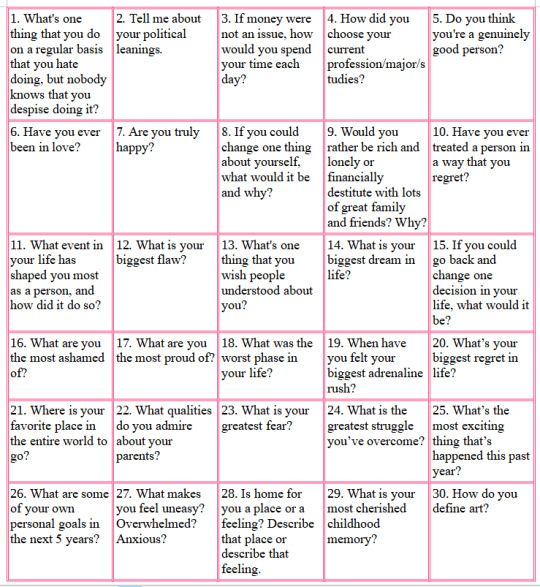
Ask each other all the questions (or agree on a different number if you feel like there are too many / not enough questions) before introducing yourself to each other (name, city, studies, hobbies, family…)
Hopefully having someone writing personal things to you about themselves will trigger your curiosity enough to help you write in your target language regularly, practice, and bond with someone !
How did I come up with this game ?
I have tried to practice languages forever and I think one of the best ways to practice it is through conversation with native people of the languages I learn. However I have always found it very hard to find a pen pal and bond with someone I don’t know. Most of the time, the conversations I’ve had with “pen pals” did not go any further than basic information about ourselves and it did not help learn the language. With this game I wish to trigger curiosity in order to practice and bond with someone so we can practice even once the game is over !
Want to play this game with me ?
I am looking to practice Spanish and Italian (also would not be against English) and I am a French native speaker. So if you are a native speaker of these languages and are learning French (or just want to play the game and are willing to write to me in your native language), that could work !
Please be somewhere between 20 and 25 yo
I am willing to use snail mail or e-mails for that game as I think it is more convenient to write “long” texts ! Also, snail mail is more personal and triggers curiosity even more
We can discuss everything in DMs ! Please hit me up !
And feel free to reblog or repost the game if you want to do the same with other languages and/or your followers :)
625 notes
·
View notes
Text
Some Cool Italian Adjectives
intramontabile: timeless, enduring, classic
ultraterreno: divine, celestial, otherworldly
incantevole: enchanting
inconfondibile: unmistakable, unique
mozzafiato: breathtaking
stellato: starry, star-studded (e.g., “cielo stellato” = “star-studded sky”)
struggente: moving, aching, painful, heart-wrenching
esterrefatto: gobsmacked
accogliente: welcoming, cozy, comfortable
421 notes
·
View notes
Photo









•SANREMO WINNERS RIGHT AFTER THEY FIND OUT THEY WON•
Tag yourself, I’m Mahmood when they announced he won the competition.
268 notes
·
View notes

